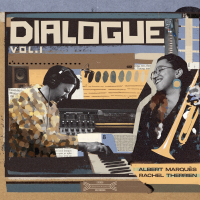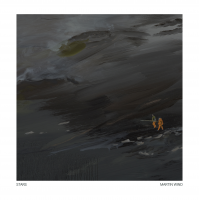Home » Jazz Articles » Album Review » Soft Machine: The Dutch Lesson
Soft Machine: The Dutch Lesson
Ratledge's "Stanley Stamp's Gibbon Album" opens the set with minimalist pattern repetition and an odd-meter groove, driven by the composer's unbridled organ solo. Jenkins' "The Soft Weed Factor" is another track from the Six studio album which gets an energetic live performance. The abstract track "Lefty" serves as an introduction to Ratledge's grooving, ostinato-based "Gesolreut," just as it had on the album. Jenkins' "Down The Road" came from the recently released Seven (Columbia, 1973), the first album to include Babbington as a full band member.
"Ealing Comedy" is a fuzz bass feature, with Babbington exploring the full range of his Fender VI six-string bass guitar. "J.S.M." is an unaccompanied drum solo giving Marshall the spotlight. Ratledge's "Chloe and the Pirates" is the last of the Six studio album selections. It is a memorable tune featuring Jenkins on the oboe, a rare instrument in rock and jazz then and now. Jenkins' "Hazard Profile" is a preview of Bundles (Harvest, 1975), the album which first introduced the guitar into the band's sound, as well as an early appearance by the virtuosic Allan Holdsworth. This lengthy suite leads right into the freest music in the set, "Improvisation" and "Gesolreut Jam." Either the band was out of tunes, or they just felt like cutting loose. Either way, the musicians and the audience both sound as if they were having a blast.
We have Bert Boogaard (a record store owner at the time) who was sitting in the front row with an Uher portable tape machine, to thank for this album. The description may make the album sound like a low-fidelity document suitable only for hardcore fans, but this is actually an exciting performance, recorded as faithfully as any other live recordings from the era.
Track Listing
Stanley Stamps Gibbon Album; Between; The Soft Weed Factor; Lefty; Gesolreut; EPV; Down the Road; Ealing Comedy; 37 1/2; J.S.M.; Riff II; Chloe and the Pirates; Hazard Profile; Improvisation; Gesolreut Jam.
Personnel
Soft Machine
band / ensemble / orchestraJohn Marshall
drumsMike Ratledge
keyboardsRoy Babbington
bass, electricKarl Jenkins
keyboardsAdditional Instrumentation
Roy Babbington: electric 6-string bass; Karl Jenkins: soprano sax, baritone sax, oboe, electric piano; John Marshall: drums; Mike Ratledge: electric piano, organ.
Album information
Title: The Dutch Lesson | Year Released: 2023 | Record Label: Cuneiform Records
Tags
About Soft Machine
Instrument: Band / ensemble / orchestra
PREVIOUS / NEXT
Support All About Jazz
 All About Jazz has been a pillar of jazz since 1995, championing it as an art form and, more importantly, supporting the musicians who make it. Our enduring commitment has made "AAJ" one of the most culturally important websites of its kind, read by hundreds of thousands of fans, musicians and industry figures every month.
All About Jazz has been a pillar of jazz since 1995, championing it as an art form and, more importantly, supporting the musicians who make it. Our enduring commitment has made "AAJ" one of the most culturally important websites of its kind, read by hundreds of thousands of fans, musicians and industry figures every month.
























